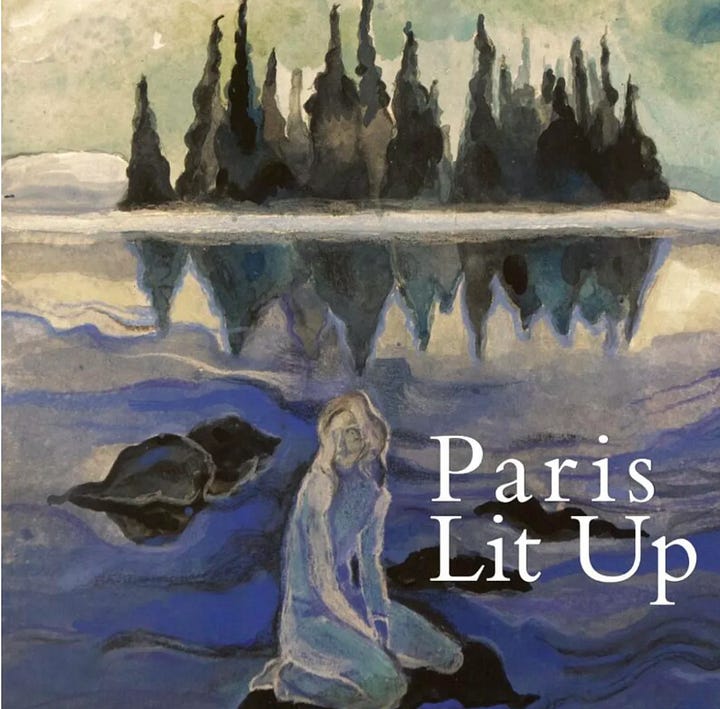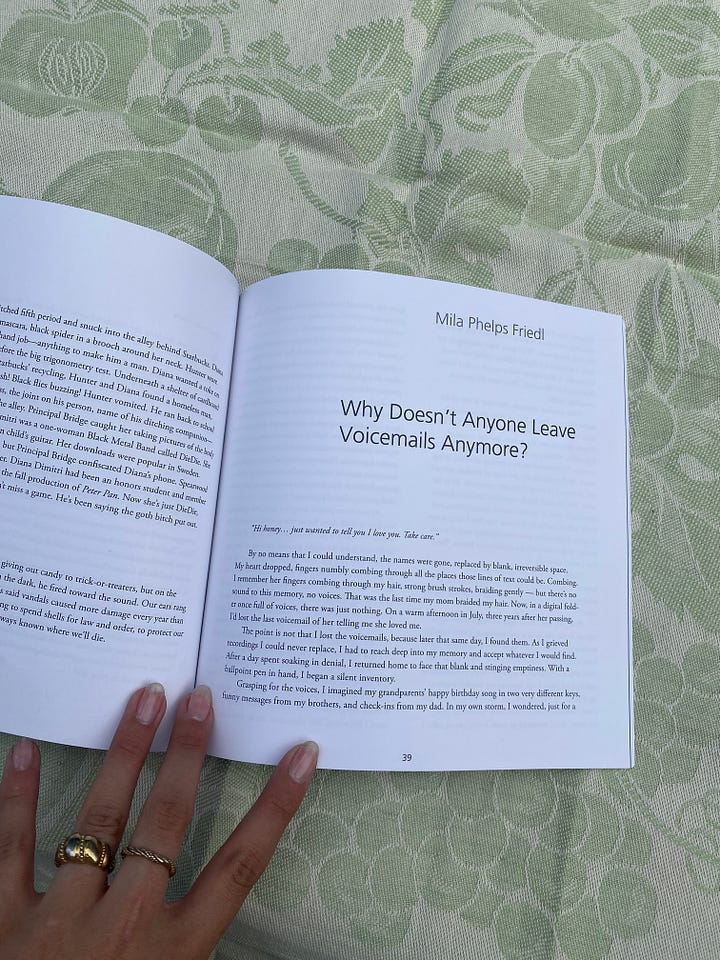Why Doesn't Anyone Leave Voicemails Anymore?
I am honored to announce that this piece was published in the 11th edition of the Paris Lit Up literary magazine. Grab a copy in person (in Paris), or for purchase on their website, linked below. x
“Hi honey… just wanted to tell you I love you. Take care.”
By no means that I could understand, the names were gone, replaced by blank, irreversible space. My heart dropped, fingers numbly combing through all the places those lines of text could be. Combing. I remember her fingers combing through my hair, strong brush strokes, braiding gently — but there’s no sound to this memory, no voices. That was the last time my mom braided my hair. Now, in a digital folder once full of voices, there was just nothing.
On a warm afternoon in July, three years after her passing, I’d lost the last voicemail of her telling me she loved me.
The point is not that I lost the voicemails, because later that same day, I found them. As I grieved recordings I could never replace, I had to reach deep into my memory and accept whatever I would find. After a day spent soaking in denial, I returned home to face that blank and stinging emptiness. With a ballpoint pen in hand, I began a silent inventory.
Grasping for the voices, I imagined my grandparents’ happy birthday song in two very different keys, funny messages from my brothers, and check-ins from my dad. In my own storm, I wondered, just for a moment, why I hadn't thought to save my voicemails, especially since three of those voices were lost to me in the most literal sense. With quiet hope chirping in my chest, I searched my digital folders, typing one word. Voicemails. A blue square with a corner tucked down illuminated on the screen. There were 85 precious recordings inside.
When you lose someone, the voice is one of the easiest things to forget. Your sensory memories fade faster than the contours of a loved one’s face. You can cling to the pictures of a person, but the sound of their voice, without an audio cue, will soften into the cortexes. It’s drowned out by a barrage of other, living voices. By dumb luck, the privilege of modern technology, or both, I’ve always kept my voicemails. 85 to be exact. The voices of family members, and dear friends, spanning 6 years of queries, stories, lamentations, and lovely call me back’s. In the same way that I keep scraps of notes, ticket stubs, and every birthday card I’ve ever gotten, these voicemails are audible love letters.
Therefore I saved them all.
“Hello, this is your grandfather speaking… I just wanted to say howdy… I haven’t the foggiest notion of what your weather is like so I can’t talk about that. Bye bye now.”
Push play and I’m 20 again, living in New York. My ear to the phone as a taxi roars past, I can’t help but smile as my grandmother spins herself into sweet circles from a small West Coast hometown. There are at least three different versions of a pitchy happy birthday song and on hard days, I can listen to my brother beatboxing a made-up melody with all two syllables of my first name. Somehow I only saved three voicemails from my mom. But I answered so many lovely phone calls. I close my eyes and sit back against a steady 31, 12, and 24 separate seconds, echoing my mother's voice in a world she’s no longer a part of.
Echoic memory is the strange way our brain retains a sound we’ve heard. When you first hear a voice, or a song, or a note, it rests in the short term. The more often it's replayed, or consistently heard, the longer it gets stored for.
To be clear, I didn’t save the voicemails because I thought about death. I just kept them with my other love notes, surprised when other people didn’t also have a full voicemail box. And, I’d often wonder, why doesn’t anyone leave voicemails anymore? Text is faster, and maybe less work. However, what the brain responds most to is sounds: it’s the timbre and cadence of the particular voice that brings back a memory. My voicemails are an echo of a person.
As our mom passed away, we sang and spoke to her, just as she’d done for us when we first entered the world. We asked if she could hear the song of the June birds, and from the slight upward turning of her lips, we took that as a yes. Even as she couldn’t see us or feel us gathered around her, we wanted our voices to assure her we were there. A brain can still respond to sounds as it’s dying, the person tucked deeply away. In death, I’m sure she heard the June birds, and all of us singing, singing for her. After she was gone, I called her phone one last time, just to hear the outgoing message. I told her that I missed her. I hung up the phone.
When my grandmother began her passing, I sat beside her as she drifted and gently held her hand. I sang Moon River and wished that she could sing along. As a child, my grandmother used to count sheep with me until I fell asleep. She often beat me to dreamland, and I’d doze off to the small breathy sounds of her sleeping beside me.
“Hey sweetie, I’m just so interested in all the stuff you’re doing… all the mischief you’re getting into, you’ve just gotta give me a call. I love you.”
These recordings are a gift, a lending of love. Ephemeral in the way that they’re saved in our brains, more permanent in the feathered memory of a voice. Voices become an accessible echo if you have the wonder of a voicemail box. My brother’s voice makes me hopeful. My dad’s voice leaves me grounded. The sound of my grandparents makes me feel safe. And my mom’s voice reminds me that I am delicate and strong all at once.
The people we love are so very much a part of us, especially if the sound of a voice can hold so much. It’s a living thing that goes on, an auditory love letter, saved on a very full voicemail box. And backed up for good measure.


This is such an honor, and I have so many people to thank - everyone who’s read my writing over the years and encouraged me to keep going. To Paris friends who asked questions about the kind of piece I wanted to write. To miss Maudie who listened as I raged over this prompt.
I raged about how much I had to say and how little I wanted to write about voices when I have struggled to find my own. And then I decided it didn’t need to be about my own. It could be about the people I love and their voices.
This is a piece for and about the people who leave voicemails, and the those who are gone but leave their voices behind. It is a piece about the gift of a full voicemail box, and the ways in which the sound of a voice is such a piece of our humanity.
Thank you so much for reading. Buy your physical copy of the magazine here.



I'm so moved by this beautiful writing, Mila~. I imagine it's a gift to yourself to express it, and it certainly feels like a gift to those of us who get to read your words. I have also wanted to share with you that I have a dozen or so of your mom's voicemails left for me, I still listen back to them and have thought you might like to hear them also, as you were often mentioned in them. xo
Congrats to you on the publication~ well-deserved.
This is so beautiful, as is everything you write. I have saved voicemails as well. . . . Something about the way the voice connects to the heart? Thank you ♥️ 🙏